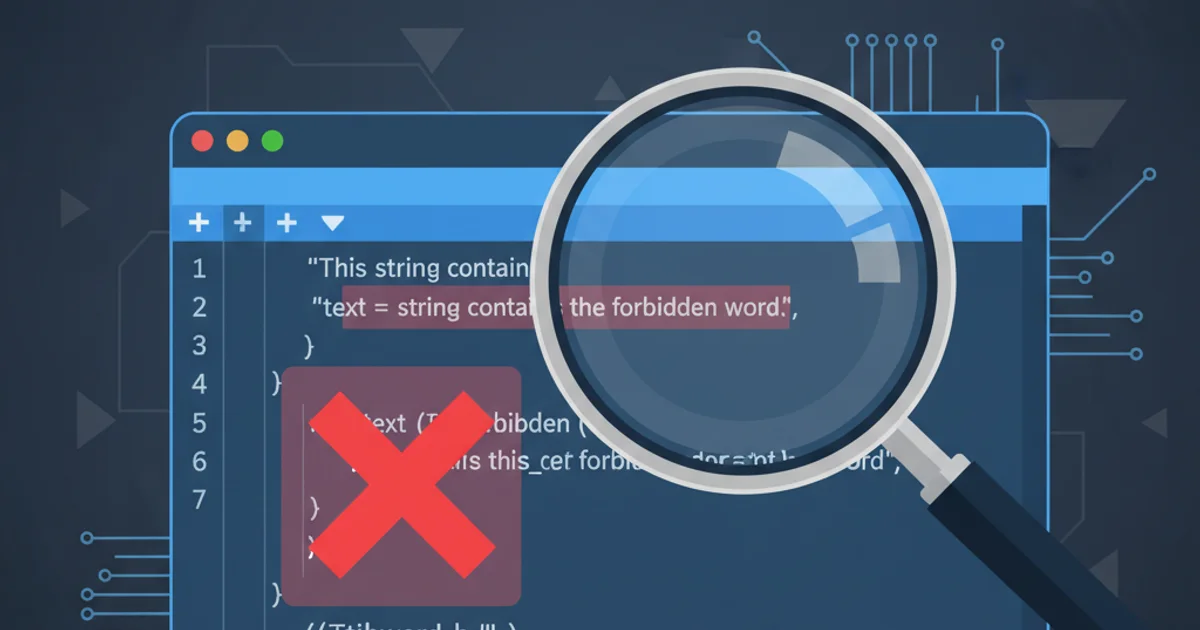A regular expression to exclude a word/string
Categories:
Mastering Regular Expressions: Excluding Specific Words or Strings

Learn how to construct regular expressions that effectively match patterns while explicitly excluding certain words or phrases, enhancing your text processing capabilities.
Regular expressions (regex) are powerful tools for pattern matching in text. While matching specific patterns is straightforward, excluding a particular word or string from a match can be a bit more nuanced. This article will guide you through various techniques to achieve this, focusing on common regex engines and their features. Understanding these methods is crucial for precise data extraction, validation, and manipulation.
The Challenge of Exclusion in Regex
The primary challenge in excluding a word or string using regex lies in the fact that regex engines are designed to find matches, not explicitly avoid them. To achieve exclusion, we often rely on negative lookaheads or other constructs that assert a condition is not met at a certain position. This allows us to define a pattern that matches only when the unwanted string is absent.
flowchart TD
A[Start Regex Process] --> B{Does current position match 'unwanted_word'?}
B -- Yes --> C[Fail Match at this position]
B -- No --> D{Does current position match 'desired_pattern'?}
D -- Yes --> E[Successful Match]
D -- No --> F[Continue Search]Conceptual flow of excluding a word in a regex match.
Method 1: Using Negative Lookaheads (?!...)
Negative lookaheads are the most common and often the most elegant way to exclude a word or string. A negative lookahead (?!pattern) asserts that pattern does not match at the current position, but it doesn't consume any characters. This means the engine checks for the pattern and then, if it's not found, proceeds with the rest of the regex from the same position.
^(?!.*\bexclude_word\b).*$
Regex to match an entire line that does NOT contain 'exclude_word'.
Let's break down ^(?!.*\bexclude_word\b).*$:
^: Asserts the start of the line.(?!.*\bexclude_word\b): This is the negative lookahead. It checks if, from the start of the line, it's not possible to findexclude_word(with word boundaries\bto ensure it's a whole word) anywhere on the line..*: If the lookahead passes (i.e.,exclude_wordis not found), this then matches the entire line.$: Asserts the end of the line.
.* inside the lookahead is crucial. Without it, (?!exclude_word) would only check if exclude_word starts at the very beginning of the line. Adding .* allows the lookahead to check for the word anywhere on the line.Method 2: Excluding a Word within a Larger Pattern
Sometimes you don't want to exclude an entire line, but rather ensure a specific word is not present within a particular part of a larger match. This can be achieved by placing the negative lookahead strategically.
\b(?!bad_word\b)\w+\b
Regex to match any word that is NOT 'bad_word'.
In this example:
\b: Word boundary, ensuring we match whole words.(?!bad_word\b): The negative lookahead asserts that the current position is not followed bybad_wordas a whole word.\w+: Matches one or more word characters (letters, numbers, underscore).\b: Another word boundary.
.* patterns within lookaheads can sometimes lead to backtracking issues.Method 3: Using grep with -v (for line exclusion)
While not strictly a regex-only solution, for command-line users, the grep utility offers a simple way to exclude lines containing a specific word using its -v (invert match) option. This is often the most straightforward approach for filtering lines.
grep -v "exclude_word" your_file.txt
Using grep to exclude lines containing 'exclude_word'.
This command will print all lines from your_file.txt that do not contain the string "exclude_word". For case-insensitive matching, you can add the -i flag: grep -vi "exclude_word" your_file.txt.
Advanced Exclusion: Multiple Words or Patterns
You can extend negative lookaheads to exclude multiple words or more complex patterns by using the alternation operator | within the lookahead.
^(?!.*\b(word1|word2|word3)\b).*$
Regex to exclude lines containing any of 'word1', 'word2', or 'word3'.
This pattern will match an entire line only if it does not contain word1, word2, or word3 as whole words. The \b ensures that 'word1' doesn't match 'sword1fish', for example.